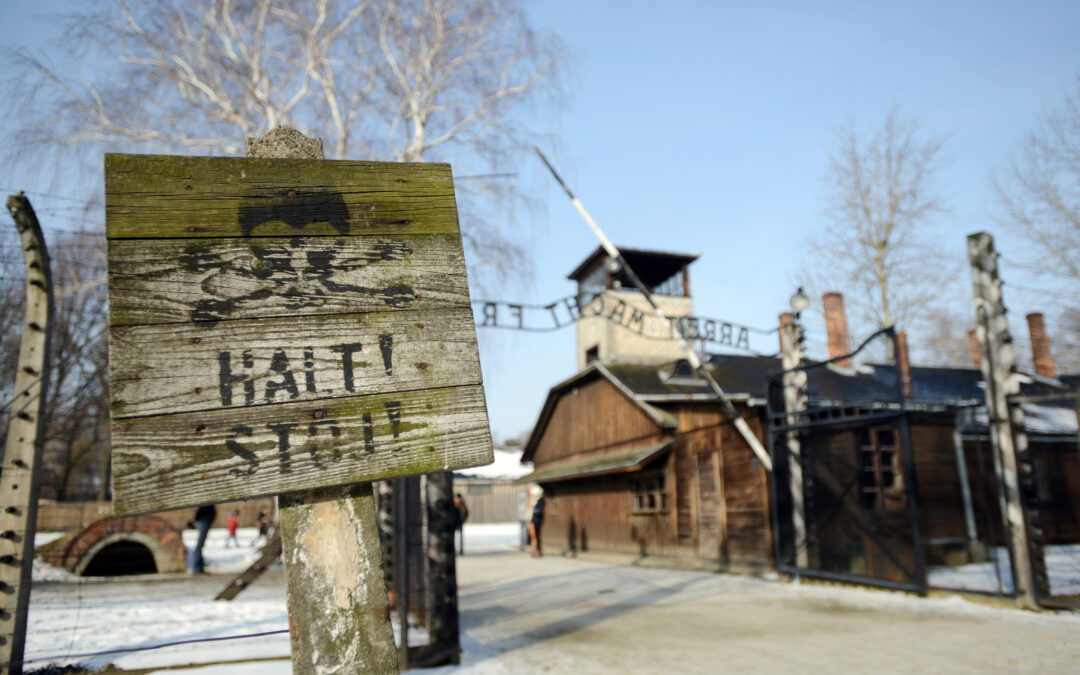Keep our news free from ads and paywalls by making a donation to support our work!

Notes from Poland is run by a small editorial team and is published by an independent, non-profit foundation that is funded through donations from our readers. We cannot do what we do without your support.
Polish prosecutors have decided not to take action against individuals who displayed a historical Ukrainian nationalist flag at a recent concert in Warsaw.
The incident prompted public anger in Poland due to the flag’s association with groups that massacred ethnic Poles during World War Two. However, prosecutors have deemed that its display did not violate Poland’s law against promotion of fascist ideologies.
Their decision was announced one day after President Karol Nawrocki submitted a proposed law to parliament that would specifically criminalise promotion of the ideologies associated with the flag.
Decyzja prokuratury w sprawie kontrowersyjnych flag na koncercie białoruskiego rapera w Warszawie wywołała wiele emocji. Co ustalono? #warszawa #prokuraturaprokuratorzy #koncert #policja #wolyn https://t.co/FnjkudXLpx
— Onet Wiadomości (@OnetWiadomosci) September 30, 2025
Last month, a concert at Warsaw’s National Stadium by Belarusian rapper Max Korzh ended in controversy after police detained over 100 fans for various criminal acts, including possession of drugs and pyrotechnics, unlawfully entering the venue, and assaulting security staff.
Subsequently, Prime Minister Donald Tusk announced that over 60 of them – 57 Ukrainians and six Belarusians – would be deported from Poland for their criminal behaviour during the concert.
Meanwhile, further controversy was aroused by pictures and videos showing someone in the crowd waving the red-and-black flag of the Ukrainian Insurgent Army (UPA).
Formed during the Second World War, the UPA was a Ukrainian nationalist partisan group that fought for independence. Figures associated with it are often celebrated as national heroes in Ukraine.
However, the UPA was also responsible for the wartime Volhynia massacres, in which up to 100,000 ethnic Polish civilians, as well as members of other minorities, were killed. The episode is regarded as a genocide in Poland, and displaying the UPA flag is seen as offensive.
Shortly after the concert, a Ukrainian man who was seen holding the flag published a video on social media in which he apologised for his actions. He said that for him the flag is a “symbol of support for the Ukrainian people” and he “did not mean to arouse negative emotions”.
Poland wants to deport 57 Ukrainians and six Belarusians involved in criminal behaviour at a concert in Warsaw on Saturday.
Meanwhile, a Ukrainian seen at the event holding a nationalist flag associated with the massacre of Poles during WW2 has apologisedhttps://t.co/aVKmaearVG
— Notes from Poland 🇵🇱 (@notesfrompoland) August 12, 2025
Prosecutors nevertheless received eight notifications from people and organisations regarding the display of the flag. Those who submitted the complaints believe the flag may have violated Poland’s law banning “promotion of a Nazi, communist, fascist or other totalitarian system”, which carries a prison sentence of up to three years.
On Tuesday this week, the Warsaw-Praga district prosecutor’s office announced that it had decided not to initiate an investigation into those allegations.
“The incident that took place lacked any appeal to recipients about anything – and therefore, the behaviour of these individuals [who displayed the flag] lacked any element of ‘promotion’ constituting prohibited behaviour,” wrote spokeswoman Karolina Staros.
She explained that “promotion is behaviour that involves spreading and popularising an idea, and attracting supporters to it”. But “the evidence collected did not reveal that the individuals who possessed the flag…acted with the intention of promoting…a fascist ideology”.
Poland's opposition has submitted a proposed law banning glorification of Ukrainian nationalist leader Stepan Bandera.
It would place propagation of Banderism alongside Nazism, fascism and communism as a crime carrying a jail sentence of up to three years https://t.co/TZxBLIa4Mx
— Notes from Poland 🇵🇱 (@notesfrompoland) December 4, 2024
The prosecutors’ announcement came a day after President Nawrocki – a conservative aligned with Poland’s opposition – submitted a bill to parliament that would expand the relevant law to specifically ban promotion of the UPA’s ideology and that of Stepan Bandera’s Organisation of Ukrainian Nationalists (OUN).
However, even if that law were to pass, it appears unlikely it would change the type of decision made by prosecutors in the abovementioned case, given that they deemed the display of the flag not to have constituted “promotion” of an ideology.
Nawrocki’s proposal was initially included as part of a bill he submitted last month on extending support for Ukrainian refugees, after he had vetoed the government’s bill on extending that support. However, his bill was not approved by parliament, which instead pushed through an alternative one.
The president last week agreed to sign the latter bill into law. But he also said that he would propose his own separate new bills banning promotion of Ukrainian nationalist ideology and toughening requirements for foreigners to obtain Polish citizenship, which he did on Monday this week.
Prezydent RP @NawrockiKn przekazał do Sejmu projekt ustawy o zmianie ustawy o Instytucie Pamięci Narodowej – Komisji Ścigania Zbrodni przeciwko Narodowi Polskiemu oraz ustawy – Kodeks karny.
Celem tej zmiany jest przeciwdziałanie rozpowszechnianiu na terytorium Rzeczypospolitej… pic.twitter.com/2u2Rr1q5t6
— Kancelaria Prezydenta RP (@prezydentpl) September 29, 2025

Notes from Poland is run by a small editorial team and published by an independent, non-profit foundation that is funded through donations from our readers. We cannot do what we do without your support.

Daniel Tilles is editor-in-chief of Notes from Poland. He has written on Polish affairs for a wide range of publications, including Foreign Policy, POLITICO Europe, EUobserver and Dziennik Gazeta Prawna.



















